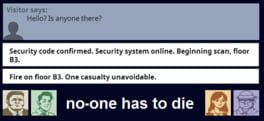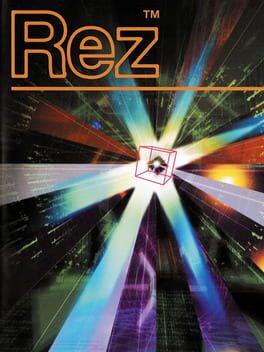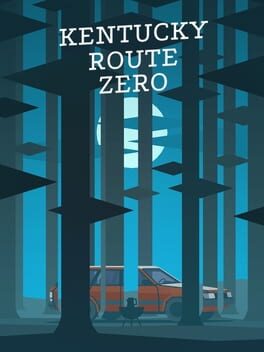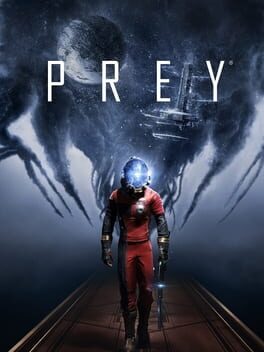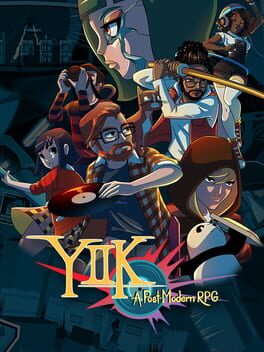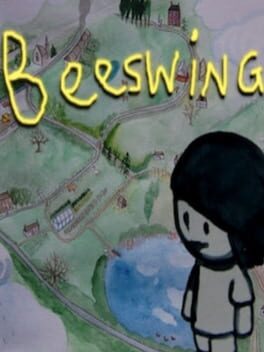MFossy
191 Reviews liked by MFossy
BioShock Infinite
2013
people like to throw around the word "pretentious" when talking about things that they don't like, but i don't think that they Actually know what it means. when we, as people, describe something as pretentious, we mean that it is attempting to peacock as though it is more intelligent or significant than it actually is.
well, buddy, look no further than this game for that definition. a game whose gameplay is worse in nearly every way than its predecessors, one that makes grand gesticulations towards the ideas of "racism" and "american exceptionalism" only to fall flat on its face every step of the way, and possessive of a "twist" so meaningless in the context of the plot that acts merely as a smokescreen to quickly make its escape as it hopes players will walk away unable to remember anything else about the game.
if there were a poll online for "The Most Pretentious Game of All Time", i would bet money on the collective reddit-esque hive mind of "gamers" choosing something like Braid. well Bioshock Infinite, you've got my vote, friendo!
well, buddy, look no further than this game for that definition. a game whose gameplay is worse in nearly every way than its predecessors, one that makes grand gesticulations towards the ideas of "racism" and "american exceptionalism" only to fall flat on its face every step of the way, and possessive of a "twist" so meaningless in the context of the plot that acts merely as a smokescreen to quickly make its escape as it hopes players will walk away unable to remember anything else about the game.
if there were a poll online for "The Most Pretentious Game of All Time", i would bet money on the collective reddit-esque hive mind of "gamers" choosing something like Braid. well Bioshock Infinite, you've got my vote, friendo!
No-one has to Die
2013
I see and understand that this game is kind of predictable or derivative or simplistic or whatever, but like, sometimes you don't need to push boundaries. no-one has to die is just a little nugget of a sci-fi thriller. It's not exceptional, no. It's not any better than it has to be, about the quality of a middling Twilight Zone episode. You can finish this game in a fraction of an hour. It's a snack. Normalize snacks.
Rez
2001
"It is only shallow people who do not judge by appearances..." - Oscar Wilde
Rez is, in a word, cool. It's very cool. It looks cool. It sounds cool. Its music is cool. It's a playable screensaver; this is a compliment. Sit back. Relax. Vibe. Let this masterfully crafted psychedelic cyberpunk demo-disc wash over you. It is a beautiful game, but beauty is skin deep. A criticism that will likely be lobbed in the direction of Rez is that its gameplay lacks depth. And this is true. Mechanically, it's a bit shallow. And I would be lying if I said I didn't want a bit more going on in the gameplay department. Maybe some kind of rhythm component.
But to say that Rez is "pretty but shallow" is wrong. Rez does not lack depth in spite of its aesthetics; its aesthetics are its depth. It is visually and sonically a delight in every way. That's not shallowness. That's what beauty is.
Rez is, in a word, cool. It's very cool. It looks cool. It sounds cool. Its music is cool. It's a playable screensaver; this is a compliment. Sit back. Relax. Vibe. Let this masterfully crafted psychedelic cyberpunk demo-disc wash over you. It is a beautiful game, but beauty is skin deep. A criticism that will likely be lobbed in the direction of Rez is that its gameplay lacks depth. And this is true. Mechanically, it's a bit shallow. And I would be lying if I said I didn't want a bit more going on in the gameplay department. Maybe some kind of rhythm component.
But to say that Rez is "pretty but shallow" is wrong. Rez does not lack depth in spite of its aesthetics; its aesthetics are its depth. It is visually and sonically a delight in every way. That's not shallowness. That's what beauty is.
been feverishly trying to finish up my last few games for 2AGO recently and I figured it'd be a good idea to do a quickie runthrough mgs3 for some easy points. run it on a low difficulty, skip all the cutscenes, and end up earning a ton of points in return. not a bad idea by the looks of it... until one of the mods suggested that I should run it on the original "snake eater" release on normal difficulty for some extra points. that didn't sound too bad! I legit went and bought a copy of the game to play on a real ps2 with a real sorta tiny CRT on our coffee table. playing mgs3 as it was originally "meant" to be played intrigued me, as it has since I was a high school student playing it for the first time.
I must have been a junior when I first played it. it was fall (I believe I played the whole game in november), and it felt like one of those gaming coming-of-age moments where I had really enveloped myself in something fantastical and totally unique. I had conquered this worldly adventure, defeated each member of the cobra unit, sabotaged the shagohod, and watched the white blossoms fade to crimson at a time in my life when I was still delving into the kinds of classic games that would really define my tastes for years to come. at the time I was actually playing on a crt as well - a much bigger one that my parents had bought two decades prior, with the 16:9 ps3 port awkwardly squashed into a 4:3 composite signal. it was challenging and often stressful, but it infused me with a sense of courage and awe at the same time. it was more complex than anything I had played, broader in scope than virtually any of the (admittedly older) worlds I had ever seen, and crafted more expertly than even most books I had read up to then.
I first knew this was going to be a rough replay when I began a hard run of the hd port after doing multiple marathon dogtag runs of mgs2 back in the early months of the pandemic. the latter I had affirmed was still my favorite (as I've spent much time privately and publically digesting), and I was expecting mgs3 to be a little rougher around the edges... but let's just say I didn't make it far past the ocelot fight. now less focused on the presentation and more on the mechanics, the game just didn't sing to me like those repeat runs of mgs2 had, and I quickly instead moved on to trying mgs4 and peace walker for the first time.
now back to this playthrough: how troubling is the infamous top-down camera that defines the original release, hastily "corrected" in the subsistence release a year later? I'm divided a bit on this. if I had a mind to, I could easily tug some contrarian thread extoling the cinematic framing that the fixed camera provides versus its clunkier free-cam counterpart a la yakuza 2, and admittedly at points I did feel this way. kojima explained the initial camera perspective was to unite the game as part of a trilogy with mgs1 and 2, and while it feels more likely to me that the the 3D camera was deemed too taxing performance-wise (the game as a whole really strains the ps2), I sort of understand the throughline he was trying to create there. playing mgs3 in its original form visually conditions the player to remember their experiences in shadow moses and the big shell, and in the process affixes its areas as extensions of the older environments rather than a full reinvention.
but mgs3 is a reinvention; it may as well be the start of a brand-new series. mgs2 perfected the old metal gear formula - military locales with slight sci-fi elements, smaller indoor areas, no natural cover, truly ghost-like stealth - in such a way that there wasn't a point to continuing on with those design parameters. mgs3 is the rough draft for a new kind of stealth game. old metal gear had its run, but it was time to catch up with titles that really took advantage of the 3D space and the locales it could create. the new metal gear made you a natural predator, slithering through foliage, feeding off the land, disposing of guards, and patiently taking stock of potential openings. and really? it's a concept that kojima didn't really nail until mgsv. in that game you have so much at your disposal that you do truly become the big boss of legend, the punished demon wrecking havoc on soviet troops through countless outposts and bases. you're actually superhuman, and unknowable to those that you prey upon. even through that it never ceases to feel dynamic and punishing if you don't plan your moves, perform reconnaissance, and stay on your belly.
mgs3 never gets quite that far. in an effort to boost believability, the ever-useful soliton radar has been stripped from snake's arsenal. a sad choice but necessary to reach the next level of truly self-reliant stealth action. on its own this wouldn't be a problem, but at the same time the guard's have been granted some sort of hivemind ability to immediately spring into action at the slightest glimpse of your person. mgs2 distinguished itself on having its AI naturally react to your presence with tension and fear, needing to radio HQ to inform the others that you were sighted, but mgs3 cuts down this reaction time to a split second instead. briefly spotted by a guard 100 feet away? now everyone in the location will descend on your location instantly. no chance to get a quick headshot because someone accidentally walked up on you alone or even use CQC. if you happen to miscalculate a single guard's location or miss their existence entirely, you will certainly be punished.
this punishment is more of a light slap on the wrist though. mgs3 leans on far more "get from point A to point B" objectives and in the process kneecaps its ability to punish you for not remaining stealthy. given the amount of lethal heavy weaponry you receive, it's obvious that stealth was never the sole intended option. snake can eat dozens of bullets and outrun guards easily, making simply running to your destination often much quicker and more viable than actually attempting a redo of a given area once your cover is blown. you can't reset to a checkpoint anyway, so might as well just skedaddle and try to get a couple screens ahead before forcing a death and getting to respawn in a later area with the alert wiped.
even when you're forced to actually remain in an area to complete a specific objective, it feels mandatory to tranq virtually everyone. the tranq gun feels somewhat divisive on whether it simplifies the gameplay loop too much, and mgs3 feels like it leans on it heavily for less experienced players to get by. the alternative is CQC - which the game is absolutely effusive about - but in a game where guards can easily hear your footsteps, actually getting close to get the grab and not just awkwardly punch them feels night impossible in many cases. it's worth mention that CQC has a clunky, over-involved set of states that left me with the manual firmly in hand for my entire first run. instead, most rooms initally led me to finding a good vantage spot, getting solid tranq shots on everyone I could see, and crawling about through hoping to death that I hadn't missed an obscured opponent.
and the CQC reminds me: oh god, the controls. mgs2 already had a bit of a stuffed control scheme, but servicable to those who would learn it. mgs3 leans too heavily on the pressure-sensitive buttons of the dualshock 2, and in the process makes certain things like firing a weapon (specifically the AK-47) feel woefully unresponsive. having to look up why I was failing counter-CQC against the boss only to find that I was not hitting the button hard enough felt like a slap to the face. the crawling is also abysmal given how vital it is to progression. it is difficult to turn and you will occasionally get stuck on objects if you go prone too close to something else, making apparent how little they felt the need to update said controls over predecessors that used it far more sparingly. weapons still lack a reticle, and certain weapons require holding L1 on top of already holding R1 just to aim down sights, which makes the motorcycle chase section more uncomfortable than it had to be. it's a system that should have been overhauled following mgs2, and it's unfortunate that this game released before over-the-shoulder aiming became the norm.
this of course is ignoring the "survival" aspects, interrupting the above gameplay with constant detours into the menu. changing camo to get a high index is mandatory if you literally don't want to be seen crawling from extremely long distances away, which forces menuing on many room transitions to adapt to the environment. god forbid you miss an important camo from not exploring, because some of them feel near mandatory (I was often screwed indoors for this reason). the food menu is an easier one, simply letting you refil your stamina with various foodstuffs you've obtained or carved. the cure menu is obnoxious and tedious, but veterans will know that using said menu is virtually pointless on normal difficulty anyway since letting wounds heal on their own is mandatory to expanding the HP bar, so I basically never bothered with it until near the end.
and I could keep going on, just blabbing about how annoying I find playing this game now, analyzing the mechanical interactions that fail, and just generally whining about what may be one of the beloved games ever made. there is no satisfaction in this for me! this particular replay, with a stuttering framerate and no freecam and skipping all the cutscenes and codec calls and just running at the instant I got an alert felt like a sledgehammer utterly crushing my perception of the game. it's so hard for me to discern what I actually think about this game. the gameplay really didn't change at the end of the day: the way I played it just did. with my original playthrough I let myself actually try to embody naked snake, and in the process experiencing his finest hour was cathartic. on this playthrough I rushed through and neutered the game's impact.
one of the ways to rectify this is to lean into the kojima-isms present in the game, which are possibly more present here than any of his other games. you can blow up the enemy's ammo/food supply to hurt their morale and make their weapons useless! blow up the helicopter at the base in the early game to prevent it from patrolling the mountains! throw rotten food at the fear to get him to eat it when he gets low on stamina! but do these really enhance the overall gameplay? or are they just trivia to spout and share? they don't legitimize the game's structure unless your criteria for a game's quality is how many weird things you can know about it. I don't want to let my opinion of the game rest entirely on such a flimsy structure. obviously those little touches are still cool, but my big praises for mgs2 don't revolve around the fact that you can use the directional mic during the emma sniper section to hear her talk to the diarrhea guy. it's still great for discussing the game with friends though; one of my friends is playing it for the first time and when he told me he decided he was just going to kill every guard in his path I had a good laugh at his expense knowing that he'd be complaining endlessly once he got to the sorrow.
so this is the real reason I've been reluctant to attempt to retrospectively review this game. having not played it since 2015, I couldn't really write a review in post without replaying the game, but something meant to be a breezy playthrough like I just finished ended up unveiling ugly aspects of the game I wish I didn't have to consider. however you as the reader conceive of my reviewing style, I certainly self-consciously see it somewhere in the more formalist space, less concerned with conveying experiential nuance in favor of revealing mechanical interactions and the strengths of the underlying rules and objectives of the game. thus it was impossible for me to work through my conception of the game without me in the process undermining my own thesis on how amazing this game actually is and how much it blew my mind back in high school.
so the replay was a bit of a blessing in disguise; it let me split my psychic image of this game a bit, and shunt all of those negative feelings into this playthrough while still maintaining the idealized vision of that First Time. I think the two can coexist, and maybe sometime I'll finally finish that hard playthrough while actually watching the cutscenes and doing everything the "right way". then through gritted teeth I can do my masterpiece review, dissecting its cold war setting and observations on the expendability of even those deemed "special" in order to further the goals of the state. maybe I can do a volgin and solidus comparison, or explain the parallels between bosses like vulcan raven and the fury, or the evolution from sniper wolf to the end. I can share my praises for the gorgeous environments, the sublime pacing, and the top-notch level design. the setpieces, that gorgeous theme, and the heartbreaking credits song. but that review isn't this review, and it may just live in my brain perpetually. mgs3 as I originally played it will continue to live as its own log, potentially review-less. the only context being that date, and the memories swirling around growing ever fainter as I grow older and less connected to my high school self. perhaps laughing at my friend for his killing spree was bit hypocritical; I did coup de grace every enemy my first playthrough, only to face the sorrow in a grueling 20-minute encounter that rattled me quite a bit. the younger me would be proud to learn I killed only one guard on the road to the sorrow fight this time.
there is something definitive I'll pull from this experience though, and it's probably a big reason why I didn't just leave this at "this game hasn't aged well for me." most of the bosses in this game are not really that impressive on a second-go-round, which is fine for metal gear; they're much more about witnessing their monologues for the first time and getting to see the big gimmick of each fight (for the record, I ran my system clock forward to kill the end quickly; I'm doing this for a competition after all!). however, I somehow forgot to pick up the snow camo - I think I grabbed it and then died and forgot to grab it again on the replay - and thus was forced to face the boss naked. the fight was protracted and unexpected, and in that way it suddenly became what my younger me remembered from all those years ago. blindly stumbling around turned to methodically picking new sniping positions where I felt momentarily safe, and desperately flailing against her CQC became praying for chances for free damage. when I finally witnessed the flowers turn in all of its single-digit framerate glory that catharsis of surmounting the challenge returned. it was elation. I did sit and watch those final scenes, and man does it still make me tear up. that graveside view of big boss honoring the true patriot will never not affect me. so that's how I know that somewhere I still think metal gear solid 3 is a unalienable masterpiece, a peak of the medium that no one should miss, and one of the unquestionable most profound games for me at the sunset of my adolescence.
but god if they had just remade this on the fox engine or something I would much rather play that instead. maybe I'll give in and try that 3ds port...
I must have been a junior when I first played it. it was fall (I believe I played the whole game in november), and it felt like one of those gaming coming-of-age moments where I had really enveloped myself in something fantastical and totally unique. I had conquered this worldly adventure, defeated each member of the cobra unit, sabotaged the shagohod, and watched the white blossoms fade to crimson at a time in my life when I was still delving into the kinds of classic games that would really define my tastes for years to come. at the time I was actually playing on a crt as well - a much bigger one that my parents had bought two decades prior, with the 16:9 ps3 port awkwardly squashed into a 4:3 composite signal. it was challenging and often stressful, but it infused me with a sense of courage and awe at the same time. it was more complex than anything I had played, broader in scope than virtually any of the (admittedly older) worlds I had ever seen, and crafted more expertly than even most books I had read up to then.
I first knew this was going to be a rough replay when I began a hard run of the hd port after doing multiple marathon dogtag runs of mgs2 back in the early months of the pandemic. the latter I had affirmed was still my favorite (as I've spent much time privately and publically digesting), and I was expecting mgs3 to be a little rougher around the edges... but let's just say I didn't make it far past the ocelot fight. now less focused on the presentation and more on the mechanics, the game just didn't sing to me like those repeat runs of mgs2 had, and I quickly instead moved on to trying mgs4 and peace walker for the first time.
now back to this playthrough: how troubling is the infamous top-down camera that defines the original release, hastily "corrected" in the subsistence release a year later? I'm divided a bit on this. if I had a mind to, I could easily tug some contrarian thread extoling the cinematic framing that the fixed camera provides versus its clunkier free-cam counterpart a la yakuza 2, and admittedly at points I did feel this way. kojima explained the initial camera perspective was to unite the game as part of a trilogy with mgs1 and 2, and while it feels more likely to me that the the 3D camera was deemed too taxing performance-wise (the game as a whole really strains the ps2), I sort of understand the throughline he was trying to create there. playing mgs3 in its original form visually conditions the player to remember their experiences in shadow moses and the big shell, and in the process affixes its areas as extensions of the older environments rather than a full reinvention.
but mgs3 is a reinvention; it may as well be the start of a brand-new series. mgs2 perfected the old metal gear formula - military locales with slight sci-fi elements, smaller indoor areas, no natural cover, truly ghost-like stealth - in such a way that there wasn't a point to continuing on with those design parameters. mgs3 is the rough draft for a new kind of stealth game. old metal gear had its run, but it was time to catch up with titles that really took advantage of the 3D space and the locales it could create. the new metal gear made you a natural predator, slithering through foliage, feeding off the land, disposing of guards, and patiently taking stock of potential openings. and really? it's a concept that kojima didn't really nail until mgsv. in that game you have so much at your disposal that you do truly become the big boss of legend, the punished demon wrecking havoc on soviet troops through countless outposts and bases. you're actually superhuman, and unknowable to those that you prey upon. even through that it never ceases to feel dynamic and punishing if you don't plan your moves, perform reconnaissance, and stay on your belly.
mgs3 never gets quite that far. in an effort to boost believability, the ever-useful soliton radar has been stripped from snake's arsenal. a sad choice but necessary to reach the next level of truly self-reliant stealth action. on its own this wouldn't be a problem, but at the same time the guard's have been granted some sort of hivemind ability to immediately spring into action at the slightest glimpse of your person. mgs2 distinguished itself on having its AI naturally react to your presence with tension and fear, needing to radio HQ to inform the others that you were sighted, but mgs3 cuts down this reaction time to a split second instead. briefly spotted by a guard 100 feet away? now everyone in the location will descend on your location instantly. no chance to get a quick headshot because someone accidentally walked up on you alone or even use CQC. if you happen to miscalculate a single guard's location or miss their existence entirely, you will certainly be punished.
this punishment is more of a light slap on the wrist though. mgs3 leans on far more "get from point A to point B" objectives and in the process kneecaps its ability to punish you for not remaining stealthy. given the amount of lethal heavy weaponry you receive, it's obvious that stealth was never the sole intended option. snake can eat dozens of bullets and outrun guards easily, making simply running to your destination often much quicker and more viable than actually attempting a redo of a given area once your cover is blown. you can't reset to a checkpoint anyway, so might as well just skedaddle and try to get a couple screens ahead before forcing a death and getting to respawn in a later area with the alert wiped.
even when you're forced to actually remain in an area to complete a specific objective, it feels mandatory to tranq virtually everyone. the tranq gun feels somewhat divisive on whether it simplifies the gameplay loop too much, and mgs3 feels like it leans on it heavily for less experienced players to get by. the alternative is CQC - which the game is absolutely effusive about - but in a game where guards can easily hear your footsteps, actually getting close to get the grab and not just awkwardly punch them feels night impossible in many cases. it's worth mention that CQC has a clunky, over-involved set of states that left me with the manual firmly in hand for my entire first run. instead, most rooms initally led me to finding a good vantage spot, getting solid tranq shots on everyone I could see, and crawling about through hoping to death that I hadn't missed an obscured opponent.
and the CQC reminds me: oh god, the controls. mgs2 already had a bit of a stuffed control scheme, but servicable to those who would learn it. mgs3 leans too heavily on the pressure-sensitive buttons of the dualshock 2, and in the process makes certain things like firing a weapon (specifically the AK-47) feel woefully unresponsive. having to look up why I was failing counter-CQC against the boss only to find that I was not hitting the button hard enough felt like a slap to the face. the crawling is also abysmal given how vital it is to progression. it is difficult to turn and you will occasionally get stuck on objects if you go prone too close to something else, making apparent how little they felt the need to update said controls over predecessors that used it far more sparingly. weapons still lack a reticle, and certain weapons require holding L1 on top of already holding R1 just to aim down sights, which makes the motorcycle chase section more uncomfortable than it had to be. it's a system that should have been overhauled following mgs2, and it's unfortunate that this game released before over-the-shoulder aiming became the norm.
this of course is ignoring the "survival" aspects, interrupting the above gameplay with constant detours into the menu. changing camo to get a high index is mandatory if you literally don't want to be seen crawling from extremely long distances away, which forces menuing on many room transitions to adapt to the environment. god forbid you miss an important camo from not exploring, because some of them feel near mandatory (I was often screwed indoors for this reason). the food menu is an easier one, simply letting you refil your stamina with various foodstuffs you've obtained or carved. the cure menu is obnoxious and tedious, but veterans will know that using said menu is virtually pointless on normal difficulty anyway since letting wounds heal on their own is mandatory to expanding the HP bar, so I basically never bothered with it until near the end.
and I could keep going on, just blabbing about how annoying I find playing this game now, analyzing the mechanical interactions that fail, and just generally whining about what may be one of the beloved games ever made. there is no satisfaction in this for me! this particular replay, with a stuttering framerate and no freecam and skipping all the cutscenes and codec calls and just running at the instant I got an alert felt like a sledgehammer utterly crushing my perception of the game. it's so hard for me to discern what I actually think about this game. the gameplay really didn't change at the end of the day: the way I played it just did. with my original playthrough I let myself actually try to embody naked snake, and in the process experiencing his finest hour was cathartic. on this playthrough I rushed through and neutered the game's impact.
one of the ways to rectify this is to lean into the kojima-isms present in the game, which are possibly more present here than any of his other games. you can blow up the enemy's ammo/food supply to hurt their morale and make their weapons useless! blow up the helicopter at the base in the early game to prevent it from patrolling the mountains! throw rotten food at the fear to get him to eat it when he gets low on stamina! but do these really enhance the overall gameplay? or are they just trivia to spout and share? they don't legitimize the game's structure unless your criteria for a game's quality is how many weird things you can know about it. I don't want to let my opinion of the game rest entirely on such a flimsy structure. obviously those little touches are still cool, but my big praises for mgs2 don't revolve around the fact that you can use the directional mic during the emma sniper section to hear her talk to the diarrhea guy. it's still great for discussing the game with friends though; one of my friends is playing it for the first time and when he told me he decided he was just going to kill every guard in his path I had a good laugh at his expense knowing that he'd be complaining endlessly once he got to the sorrow.
so this is the real reason I've been reluctant to attempt to retrospectively review this game. having not played it since 2015, I couldn't really write a review in post without replaying the game, but something meant to be a breezy playthrough like I just finished ended up unveiling ugly aspects of the game I wish I didn't have to consider. however you as the reader conceive of my reviewing style, I certainly self-consciously see it somewhere in the more formalist space, less concerned with conveying experiential nuance in favor of revealing mechanical interactions and the strengths of the underlying rules and objectives of the game. thus it was impossible for me to work through my conception of the game without me in the process undermining my own thesis on how amazing this game actually is and how much it blew my mind back in high school.
so the replay was a bit of a blessing in disguise; it let me split my psychic image of this game a bit, and shunt all of those negative feelings into this playthrough while still maintaining the idealized vision of that First Time. I think the two can coexist, and maybe sometime I'll finally finish that hard playthrough while actually watching the cutscenes and doing everything the "right way". then through gritted teeth I can do my masterpiece review, dissecting its cold war setting and observations on the expendability of even those deemed "special" in order to further the goals of the state. maybe I can do a volgin and solidus comparison, or explain the parallels between bosses like vulcan raven and the fury, or the evolution from sniper wolf to the end. I can share my praises for the gorgeous environments, the sublime pacing, and the top-notch level design. the setpieces, that gorgeous theme, and the heartbreaking credits song. but that review isn't this review, and it may just live in my brain perpetually. mgs3 as I originally played it will continue to live as its own log, potentially review-less. the only context being that date, and the memories swirling around growing ever fainter as I grow older and less connected to my high school self. perhaps laughing at my friend for his killing spree was bit hypocritical; I did coup de grace every enemy my first playthrough, only to face the sorrow in a grueling 20-minute encounter that rattled me quite a bit. the younger me would be proud to learn I killed only one guard on the road to the sorrow fight this time.
there is something definitive I'll pull from this experience though, and it's probably a big reason why I didn't just leave this at "this game hasn't aged well for me." most of the bosses in this game are not really that impressive on a second-go-round, which is fine for metal gear; they're much more about witnessing their monologues for the first time and getting to see the big gimmick of each fight (for the record, I ran my system clock forward to kill the end quickly; I'm doing this for a competition after all!). however, I somehow forgot to pick up the snow camo - I think I grabbed it and then died and forgot to grab it again on the replay - and thus was forced to face the boss naked. the fight was protracted and unexpected, and in that way it suddenly became what my younger me remembered from all those years ago. blindly stumbling around turned to methodically picking new sniping positions where I felt momentarily safe, and desperately flailing against her CQC became praying for chances for free damage. when I finally witnessed the flowers turn in all of its single-digit framerate glory that catharsis of surmounting the challenge returned. it was elation. I did sit and watch those final scenes, and man does it still make me tear up. that graveside view of big boss honoring the true patriot will never not affect me. so that's how I know that somewhere I still think metal gear solid 3 is a unalienable masterpiece, a peak of the medium that no one should miss, and one of the unquestionable most profound games for me at the sunset of my adolescence.
but god if they had just remade this on the fox engine or something I would much rather play that instead. maybe I'll give in and try that 3ds port...
BioShock Infinite
2013
i love when a captive young girl is raised as essentially a feral plaything confined to a birdcage by psychotic racists her entire life but after being freed is a quippy well-adjusted girl-next-door hottie and just sassy enough disney princess who sings zooey deschanel covers of abolition spirituals to smiling black children the game doesnt give a shit about
League of Legends
2009
Killer7
2005
Kentucky Route Zero
2013
I often struggle with abstract stories and ideas. A childhood of Montana education systems and Nostalgia Critic videos have sort of poisoned my mind to largely view text as literally as possible. At the same time, I really treasure the unexplained in stories. Its hard as a writer to leave something up to interpretation, but it adds a layer of discussion and analysis to a work that I think so many stories tend to lack.
The idea of Games As Art is a hard topic because it slams right into that question of what exactly makes something art. I'm not looking to point fingers at any group of people online, so I'll just fill in David Cage as my strawman. Your David Cage types think the Games As Art question is all about creating something that everyone loves and adores without thinking too much deeper than that. I generally tend to imagine art needs to serve a purpose. An argument, an idea. But that's not fair either, forcing a requirement that a story shouldn't be beholden to. Maybe I don't know how to define art. Maybe I'm not supposed to.
I don't know how to define Kentucky Route Zero either. Its an ambitious story that somehow feels low-scale despite the full reach of its ideas. So much of the story leaves itself to your own imagination. Building up characters and backstories to your own leisure. You aren't controlling everything per se, but you are shaping things. Interpreting them. Its not a game where choices matter or change things. You can't stop the direction of the story. You can't keep every character safe. But... your choices still matter. It matters in the sense that you made those choices. They matter to you.
Tl:dr
The critically acclaimed game is good and made me cry.
The idea of Games As Art is a hard topic because it slams right into that question of what exactly makes something art. I'm not looking to point fingers at any group of people online, so I'll just fill in David Cage as my strawman. Your David Cage types think the Games As Art question is all about creating something that everyone loves and adores without thinking too much deeper than that. I generally tend to imagine art needs to serve a purpose. An argument, an idea. But that's not fair either, forcing a requirement that a story shouldn't be beholden to. Maybe I don't know how to define art. Maybe I'm not supposed to.
I don't know how to define Kentucky Route Zero either. Its an ambitious story that somehow feels low-scale despite the full reach of its ideas. So much of the story leaves itself to your own imagination. Building up characters and backstories to your own leisure. You aren't controlling everything per se, but you are shaping things. Interpreting them. Its not a game where choices matter or change things. You can't stop the direction of the story. You can't keep every character safe. But... your choices still matter. It matters in the sense that you made those choices. They matter to you.
Tl:dr
The critically acclaimed game is good and made me cry.
Prey
2017
Disco Elysium
2019
"You meet a new person, you go with him," Kid mused, "and suddenly you get a whole new city." He'd offered it as a small and oblique compliment.
Pepper only glanced at him, curiously.
"You go down new streets, you see houses you never saw before, pass places you didn't know were there. Everything changes."
"This way." Pepper ducked between buildings not two feet apart.
They sidled between the flaking boards. The ground was a-glitter from the broken windows.
Pepper said, "Sometimes it changes even if you go the same way."
- Samuel R. Delany, Dhalgren
Pepper only glanced at him, curiously.
"You go down new streets, you see houses you never saw before, pass places you didn't know were there. Everything changes."
"This way." Pepper ducked between buildings not two feet apart.
They sidled between the flaking boards. The ground was a-glitter from the broken windows.
Pepper said, "Sometimes it changes even if you go the same way."
- Samuel R. Delany, Dhalgren
The worst (best??) kind of disappointing art: the kind that you could tell was made by real people. The kind with the sort of passion and drive that can only be provided by someone who is thoroughly convinced that they have something to say that you don't already know. Its story is convoluted nonsense, its characters are bland and uninteresting, its combat is needlessly frustrating. It never really commits to any one idea, opting to implement many (and fail at executing all of them). But what really breaks this game for me is its self-consciousness. Anytime its weaknesses become too apparent, the writers simply remark on the fact that they are weaknesses. Apparently, you can get away with almost any bad writing as long as you let the player know that you know it's bad. It's a game that hopes to directly address the player and their flaws, yet all of its droning speeches about the meaning of existence find relevance only among the developers themselves. Playing this game is like watching the developers try to extract some kind of meaning out of the mistakes that they've made, or the mistakes that they think their "generation" has made, or whatever. But it's so dumb. Just... so so dumb. Big dumb game.
Play this game if you want to watch the world's longest, most excruciating train wreck. I couldn't tell you if it was worth it, but this is easily one of the most memorable bad games I've ever played. Will certainly be thinking about this game for a long time, even if it's not for the reasons the developers might hope. I guess that makes it a success.
edit: after over a year of thinking about this game, I'm convinced that I love it now and I cannot tell whether or not that love is ironic anymore. Either way, this review is outdated. Amazing game, masterpiece game. I.V hype is real.
Play this game if you want to watch the world's longest, most excruciating train wreck. I couldn't tell you if it was worth it, but this is easily one of the most memorable bad games I've ever played. Will certainly be thinking about this game for a long time, even if it's not for the reasons the developers might hope. I guess that makes it a success.
edit: after over a year of thinking about this game, I'm convinced that I love it now and I cannot tell whether or not that love is ironic anymore. Either way, this review is outdated. Amazing game, masterpiece game. I.V hype is real.
a horror story about playground lies and where they come from and why children think they need them.
edit several days later: I dunno, like I gave kind of a quick one-sentence pitch but there's really something... magical about this game. It guts you in a way that's hard to describe. It has this sense of unreality, through the viewpoint of children trying to understand and succeed through unfair rules. I'm still ruminating on it basically constantly. It cuts deep.
edit several days later: I dunno, like I gave kind of a quick one-sentence pitch but there's really something... magical about this game. It guts you in a way that's hard to describe. It has this sense of unreality, through the viewpoint of children trying to understand and succeed through unfair rules. I'm still ruminating on it basically constantly. It cuts deep.
Pac-Man
1980
Beeswing
2014
"A good tree has victims".
Stare close enough at the screen and you start to see the human hands appreciatively building every one of Beeswing's vignettes. I was thoroughly not expecting a game to understand, to so deftly and honestly articulate grief, nostalgia and mending. Beeswing is just honest, It’s not trying to impress anyone or manipulate them into feeling something, it simply wishes to exist - just as its inhabitants live quietly near and far from their loved ones, opening up to anyone who'll listen. Beeswing isn’t sad, but it isn’t happy either. It recounts the lives of (I assume) people the developer knew growing up with a plain biographical melancholy that is difficult to properly explain. I’m so used to media recounting horrible events, making me depressed for the sake of a narrative that’s supposed to mean something. But Beeswing never tried to bring me down, in fact it’s so clean in its indifference to how the player feels that it would seem cold if not for how tangible and raw the things it says and the way it shows you them are. A recurring motif in this game in itself is this kind of honesty, not necessarily to "make the most" of our limited time on this earth, but to live true - to yourselves and others, as it's the greatest way to reciprocate love.
Stare close enough at the screen and you start to see the human hands appreciatively building every one of Beeswing's vignettes. I was thoroughly not expecting a game to understand, to so deftly and honestly articulate grief, nostalgia and mending. Beeswing is just honest, It’s not trying to impress anyone or manipulate them into feeling something, it simply wishes to exist - just as its inhabitants live quietly near and far from their loved ones, opening up to anyone who'll listen. Beeswing isn’t sad, but it isn’t happy either. It recounts the lives of (I assume) people the developer knew growing up with a plain biographical melancholy that is difficult to properly explain. I’m so used to media recounting horrible events, making me depressed for the sake of a narrative that’s supposed to mean something. But Beeswing never tried to bring me down, in fact it’s so clean in its indifference to how the player feels that it would seem cold if not for how tangible and raw the things it says and the way it shows you them are. A recurring motif in this game in itself is this kind of honesty, not necessarily to "make the most" of our limited time on this earth, but to live true - to yourselves and others, as it's the greatest way to reciprocate love.

